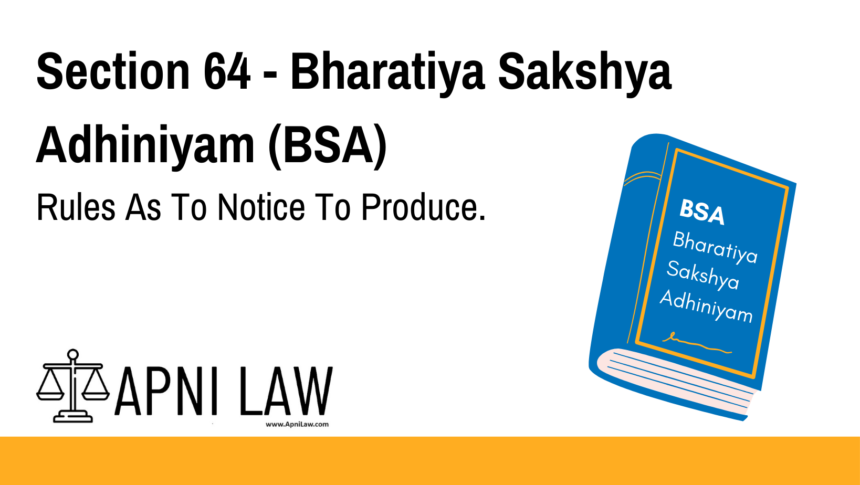Code: Section 64 BSA
Secondary evidence of the contents of the documents referred to in clause (a) of
section 60, shall not be given unless the party proposing to give such secondary evidence
has previously given to the party in whose possession or power the document is, or to his
advocate or representative, such notice to produce it as is prescribed by law; and if no
notice is prescribed by law, then such notice as the Court considers reasonable under the
circumstances of the case:
Provided that such notice shall not be required in order to render secondary evidence
admissible in any of the following cases, or in any other case in which the Court thinks fit
to dispense with it:—
(a) when the document to be proved is itself a notice;
(b) when, from the nature of the case, the adverse party must know that he will
be required to produce it;
(c) when it appears or is proved that the adverse party has obtained possession
of the original by fraud or force;
(d) when the adverse party or his agent has the original in Court;
(e) when the adverse party or his agent has admitted the loss of the document;
(f) when the person in possession of the document is out of reach of, or not
subject to, the process of the Court.
Explanation of Section 64 BSA
Section 64 lays down the procedure for using secondary evidence in place of a document that is in someone else’s possession. It ensures that a fair opportunity is given to the other party to produce the original document before allowing substitutes such as copies or oral accounts.
The rule is rooted in fairness—before relying on secondary evidence, the opposing party must be given reasonable notice unless exceptional circumstances exist.
Key Provisions:
-
Secondary evidence under Section 60(a) requires prior notice to the party who holds the original.
-
If no formal legal provision specifies the notice, the Court must determine what is reasonable.
-
Exceptions allow bypassing this notice if:
-
The document is itself a notice.
-
The adverse party should reasonably expect the document to be requested.
-
The original was fraudulently obtained.
-
The document is already in Court.
-
The party admits the document is lost.
-
The holder of the document is out of reach of the Court.
-
Illustration
Example 1: Partnership Agreement in Adverse Possession
A partner alleges that another has the original partnership deed. Before submitting a copy as secondary evidence, notice must be given. However, if the opposing party admits loss of the original, notice is unnecessary.
Example 2: The Document is Itself a Legal Notice
If the document in question is a legal notice (e.g., notice of termination), then no separate notice to produce is required under Section 64.
Example 3: Fraudulently Obtained Documents
If Party A can prove that Party B obtained the original document through fraudulent means, the Court may allow secondary evidence without requiring notice.
Common Questions and Answers on Section 64 BSA
-
Why is notice necessary before presenting secondary evidence?
-
To give the party holding the original a chance to produce it, thereby ensuring fairness and completeness in evidence.
-
-
Is notice required in all cases?
-
No. Section 64 outlines several exceptions such as fraud, loss, or when the document is itself a notice.
-
-
Who decides what constitutes a “reasonable notice”?
-
The Court determines what is reasonable based on the facts and circumstances of the case.
-
-
Can secondary evidence be denied if no notice is given?
-
Yes, unless the case falls within the exceptions listed in Section 64 or the Court waives the requirement.
-
-
How does Section 64 relate to Section 60?
-
Section 64 provides procedural support to Section 60(a), ensuring that secondary evidence is not casually introduced when the original is available.
-
Conclusion
Section 64 of the Bharatiya Sakshya Adhiniyam (BSA) serves as a safeguard to ensure that original documents are prioritized and secondary evidence is only introduced with proper procedure. It balances the need for flexibility in presenting evidence with the requirement for fairness and accountability.
For more detailed guides on the Bharatiya Sakshya Adhiniyam, visit ApniLaw.








